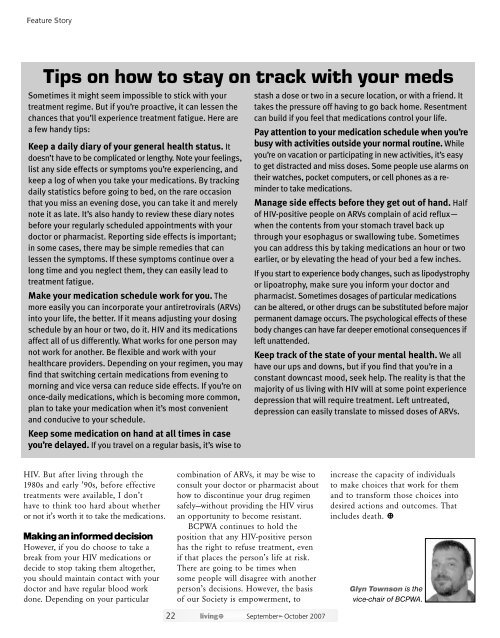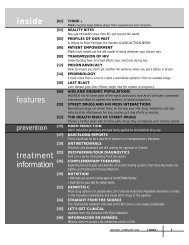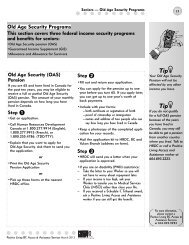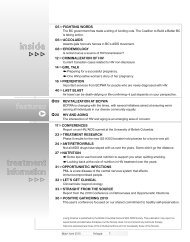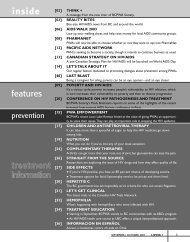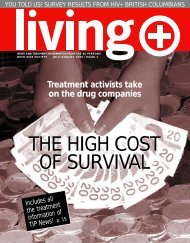iv poz mag.qxd - Positive Living BC
iv poz mag.qxd - Positive Living BC
iv poz mag.qxd - Positive Living BC
Create successful ePaper yourself
Turn your PDF publications into a flip-book with our unique Google optimized e-Paper software.
issue 50.<strong>qxd</strong>:l<strong>iv</strong> <strong>poz</strong> <strong>mag</strong>.<strong>qxd</strong> 9/3/07 4:04 PM Page 22<br />
Feature Story<br />
Tips on how to stay on track with your meds<br />
Sometimes it might seem impossible to stick with your<br />
treatment regime. But if you’re proact<strong>iv</strong>e, it can lessen the<br />
chances that you’ll experience treatment fatigue. Here are<br />
a few handy tips:<br />
Keep a daily diary of your general health status. It<br />
doesn’t have to be complicated or lengthy. Note your feelings,<br />
list any side effects or symptoms you’re experiencing, and<br />
keep a log of when you take your medications. By tracking<br />
daily statistics before going to bed, on the rare occasion<br />
that you miss an evening dose, you can take it and merely<br />
note it as late. It’s also handy to review these diary notes<br />
before your regularly scheduled appointments with your<br />
doctor or pharmacist. Reporting side effects is important;<br />
in some cases, there may be simple remedies that can<br />
lessen the symptoms. If these symptoms continue over a<br />
long time and you neglect them, they can easily lead to<br />
treatment fatigue.<br />
Make your medication schedule work for you. The<br />
more easily you can incorporate your antiretrovirals (ARVs)<br />
into your life, the better. If it means adjusting your dosing<br />
schedule by an hour or two, do it. HIV and its medications<br />
affect all of us differently. What works for one person may<br />
not work for another. Be flexible and work with your<br />
healthcare providers. Depending on your regimen, you may<br />
find that switching certain medications from evening to<br />
morning and vice versa can reduce side effects. If you’re on<br />
once-daily medications, which is becoming more common,<br />
plan to take your medication when it’s most convenient<br />
and conduc<strong>iv</strong>e to your schedule.<br />
Keep some medication on hand at all times in case<br />
you’re delayed. If you travel on a regular basis, it’s wise to<br />
stash a dose or two in a secure location, or with a friend. It<br />
takes the pressure off having to go back home. Resentment<br />
can build if you feel that medications control your life.<br />
Pay attention to your medication schedule when you’re<br />
busy with act<strong>iv</strong>ities outside your normal routine. While<br />
you’re on vacation or participating in new act<strong>iv</strong>ities, it’s easy<br />
to get distracted and miss doses. Some people use alarms on<br />
their watches, pocket computers, or cell phones as a reminder<br />
to take medications.<br />
Manage side effects before they get out of hand. Half<br />
of HIV-posit<strong>iv</strong>e people on ARVs complain of acid reflux—<br />
when the contents from your stomach travel back up<br />
through your esophagus or swallowing tube. Sometimes<br />
you can address this by taking medications an hour or two<br />
earlier, or by elevating the head of your bed a few inches.<br />
If you start to experience body changes, such as lipodystrophy<br />
or lipoatrophy, make sure you inform your doctor and<br />
pharmacist. Sometimes dosages of particular medications<br />
can be altered, or other drugs can be substituted before major<br />
permanent da<strong>mag</strong>e occurs. The psychological effects of these<br />
body changes can have far deeper emotional consequences if<br />
left unattended.<br />
Keep track of the state of your mental health. We all<br />
have our ups and downs, but if you find that you’re in a<br />
constant downcast mood, seek help. The reality is that the<br />
majority of us l<strong>iv</strong>ing with HIV will at some point experience<br />
depression that will require treatment. Left untreated,<br />
depression can easily translate to missed doses of ARVs.<br />
HIV. But after l<strong>iv</strong>ing through the<br />
1980s and early ’90s, before effect<strong>iv</strong>e<br />
treatments were available, I don’t<br />
have to think too hard about whether<br />
or not it’s worth it to take the medications.<br />
Making an informed decision<br />
However, if you do choose to take a<br />
break from your HIV medications or<br />
decide to stop taking them altogether,<br />
you should maintain contact with your<br />
doctor and have regular blood work<br />
done. Depending on your particular<br />
combination of ARVs, it may be wise to<br />
consult your doctor or pharmacist about<br />
how to discontinue your drug regimen<br />
safely—without providing the HIV virus<br />
an opportunity to become resistant.<br />
<strong>BC</strong>PWA continues to hold the<br />
position that any HIV-posit<strong>iv</strong>e person<br />
has the right to refuse treatment, even<br />
if that places the person’s life at risk.<br />
There are going to be times when<br />
some people will disagree with another<br />
person’s decisions. However, the basis<br />
of our Society is empowerment, to<br />
increase the capacity of ind<strong>iv</strong>iduals<br />
to make choices that work for them<br />
and to transform those choices into<br />
desired actions and outcomes. That<br />
includes death. 5<br />
Glyn Townson is the<br />
vice-chair of <strong>BC</strong>PWA.<br />
22 l<strong>iv</strong>ing5 SeptemberqOctober 2007


